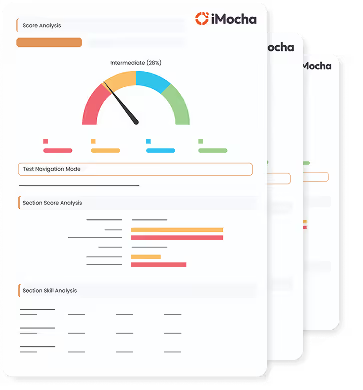


Choose easy, medium, or tricky questions from our skill libraries to assess candidates of different experience levels.
Choose easy, medium, or tricky questions from our skill libraries to assess candidates of different experience levels.

Choose easy, medium, or tricky questions from our skill libraries to assess candidates of different experience levels.

Choose easy, medium, or tricky questions from our skill libraries to assess candidates of different experience levels.
This a comprehensive PDF report, which you can instantly download and share with your hiring team or candidates for seamless collaboration.
Download Sample Report



iMocha’s Perl online test enables recruiters and hiring managers to hire job-fit candidates quickly and make unbiased hiring decisions. This test is useful for hiring PERL Developers, PHP PERL Developers, and Senior Software Engineers in Perl Programming. Our Perl test helped our customers reduce technical screening time by 80%.





%20(1).webp)
PERL is a family of high-level and general-purpose programming languages. It runs on a variety of platforms like MacOS, Windows, and various versions of UNIX. PERL also supports procedural and object-oriented programming. This test is specially designed to check a PERL developer’s technical and practical skills – as per industry standards.
#1 Identifying job-fit candidates based on job roles
You can create customized skill assessments for any given job role. Using this feature, you can choose questions from different skill types, including functional, technical, and soft skills. For example, with our customized Perl test, you can evaluate candidates’ knowledge of Documentation Skills, Nested Arrays, Unix shell Commands, Linux, and Communication Skills and assess the best individuals for the job.
#2 Skill-gap analysis of your employees
iMocha allows you to measure employees' skill competency through Perl training assessments. It determines the existing skill level and identifies the areas for growth. It also measures the knowledge and impact of the training and traces individual employees’ progress. For example, you can use our Perl training assessments to identify a consultant’s knowledge about Anonymous Subroutines, Arithmetic Expressions, APIs, and other skills and perform a skill gap analysis.

Online Perl script assessment helps to screen the candidates who possess skills as follows:
Assessing candidates with Perl online tests is secure and reliable. You can use our role-based access control feature to restrict system access based on the roles of individual users within the recruiting team. Features like window violation and image and video proctoring help detect cheating during the test.
Perl assessment enables employers and recruiters to identify potential hires by evaluating working skills and job readiness.







.webp)
.webp)
.webp)
.webp)





